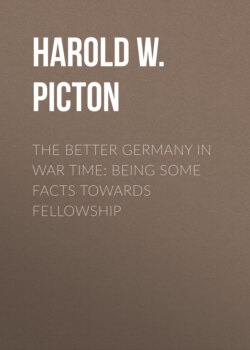Читать книгу The Better Germany in War Time: Being Some Facts Towards Fellowship - Harold W. Picton - Страница 15
На сайте Литреса книга снята с продажи.
Crefeld.
ОглавлениеTable of Contents
At Crefeld Mr. Michelson visited the camp for interned officers. Of these interned 137 were British. The general statements of the Commandant “were afterwards independently confirmed by the one interned British medical officer, Captain Benjamin Johnson, who said that as a physician he had no complaints to make or improvements to suggest. He did, however, complain on the score of being held prisoner, but the Commandant and the German medical officer, and I with them, feel that the presence of a British medical officer in the barracks is desirable.
“The bath room which I saw has a floor space of about 1,500 square feet, one-half of which, drained in the centre, lies under some 20 shower nozzles. There are a couple of porcelain tubs in the other half, and in the centre there is a large stove. Hot and cold water is available. The British officers were enthusiastic in their praise of this room.
“As regards the sleeping rooms, wash rooms and latrines, and their equipment, the general German housing regulations are being fully complied with. I visited a great many sleeping rooms, and in none of them did I find overcrowding, uncleanliness, insufficient light, heat, or equipment.
“The orderlies are housed in stalls in one of the stables, and in their regard, too, the general German housing regulations are being fully complied with. Their quarters looked sufficiently comfortable and clean, and two or three of the orderlies with whom I spoke said that they had no complaints to make, and that they were happy to be interned with, and not apart from their officers. I visited the one building fenced off from the others—also a stable—in which German soldiers are quartered, and I found the accommodation and equipment there to be precisely that furnished to the orderlies. The comparison was, however, somewhat in favour of the orderlies, for the orderlies were fewer in number and less crowded than the soldiers. Although exercise is not compulsory, there is ample space in the central rectangle for out-door games of all sorts and for walking. No appropriate form of exercise, recreation, or amusement is denied the interned, and opportunities for distraction within the barracks lie largely in their own hands. Smoking is freely permitted, and English, French and Russian songs are sung without interference. The walls of one French officer’s room were covered with good-natured caricature drawings. When I asked the Commandant if the interned might not be permitted to go out into the country under guard, he replied that the barracks were too near the frontier for that, and he mentioned that one officer had already escaped and succeeded in getting over the border.”
Food is provided to all officers at the rate of two marks daily. This absorbs the whole of a lieutenant’s pay, and the Commandant recognised the difficulty. But “none of the officers want the present arrangement altered if alteration is to involve a decrease in the quality, quantity, or variety of the food furnished. All of them agree that the food is entirely satisfactory, under the circumstances, and that it is fully worth two marks a day.
“The officers told me that letters and packages were delivered to them with commendable rapidity, and that the Commandant was unfailingly obliging when, for important reasons, any officer needed to send off more than two letters a month.”
